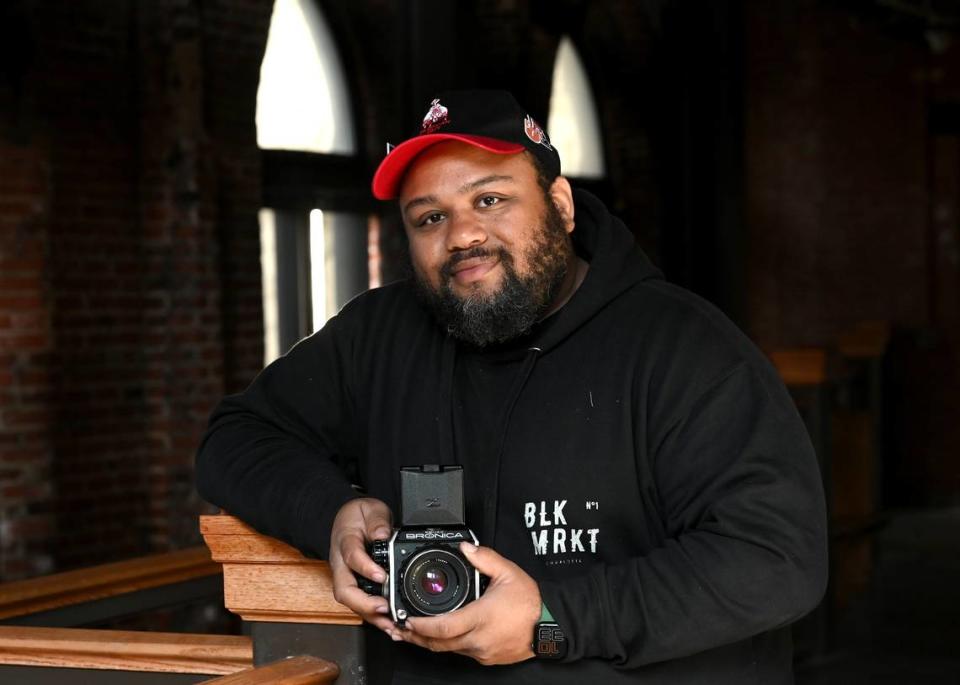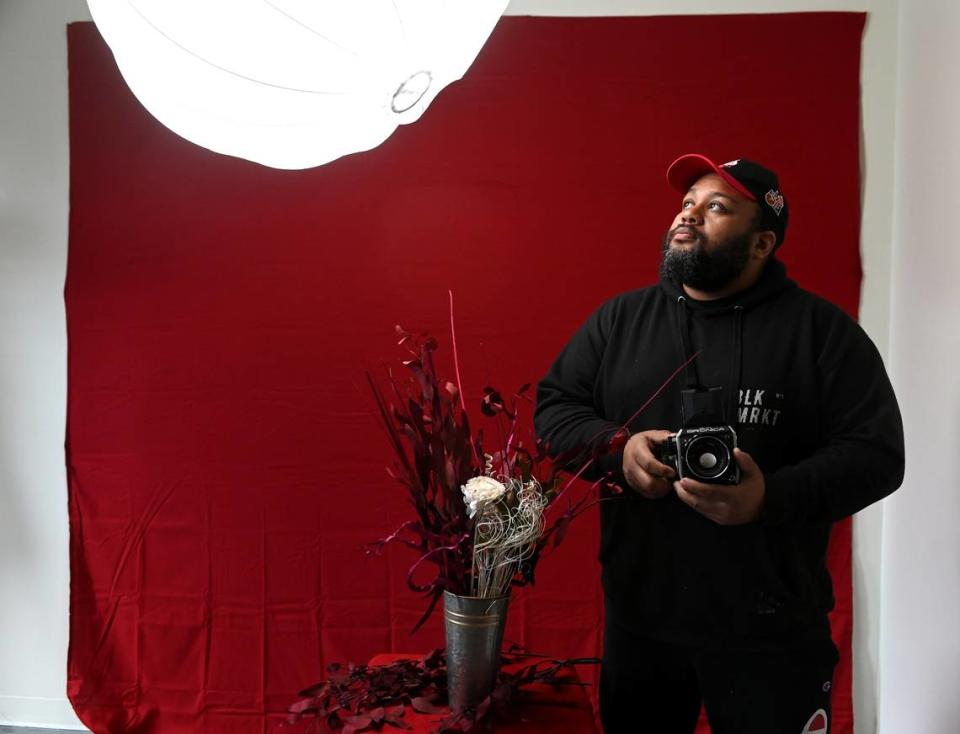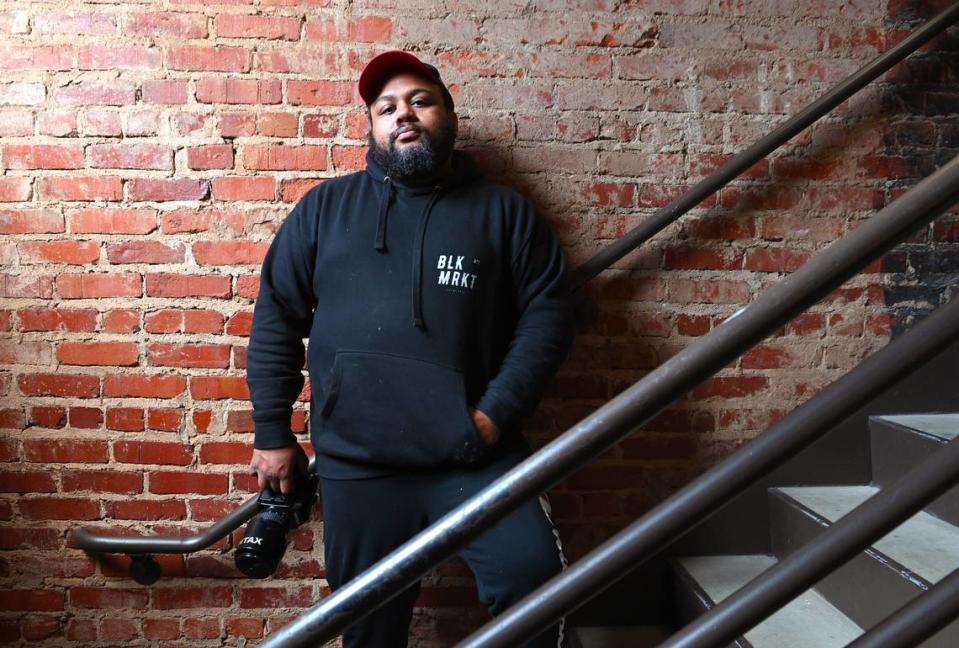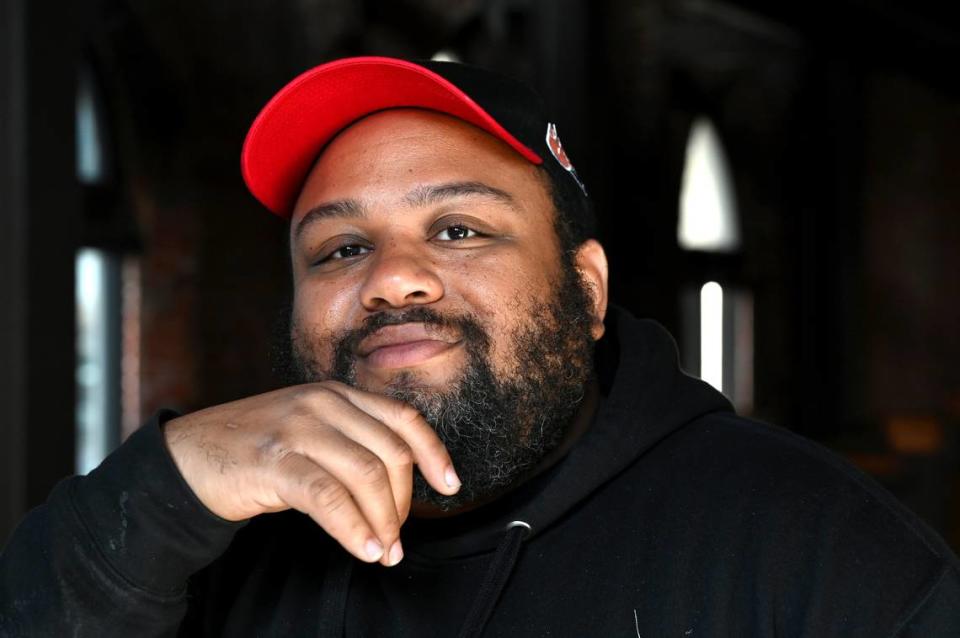‘Sir Will’ needed to define what kind of artist he wanted to be. Here’s what happened next
For six years, photographer and producer Will Jenkins, known artistically as “Sir Will”, has vied for a residency at the McColl Center. This year, he finally made it happen.
He’s also the only local artist-in-residence at the McColl Center for the current winter/spring season. Jenkins, 37, said his work, a combination of photography, video and mixed media, is influenced by Southern style and culture, especially in the Black community.
“I never considered myself an artist or a creative — fully — until about three or four years ago,” he said. Alongside his full-time photography and video production work, Jenkins held discussions with McColl Center President Alli Celebron-Brown and other other local artists, and worked to define and discover his creative identity.
Jenkins taught workshops and held online courses through the McColl Center, and every year, he’d apply to a residency program.
“To be considered an artist, I felt like I needed a residency to find myself,” he said. “But it turns out, I had to define myself first and then I finally got in.”

Since January, he has walked the halls of the contemporary arts hub uptown with Polish artist Zuzanna Dyrda, Atlanta-based Shanequa Gay, and Tadeo Muleiro, an Argentine artist.
For the residency, which ends in mid-April, Jenkins has partnered with Atrium Health to capture the journeys of rehabilitating hospital patients and the healing process.
In search of opportunity
Growing up, Jenkins split time between Clarksville, Tennessee, a town northwest of Nashville near the Kentucky state line, and Dalzell, S.C., a town of about 3,000 people about 45 miles east of Columbia.
In Dalzell, where Jenkins attended high school, “there’s no stop lights, the only restaurant is called the Chicken Shack, and it was a big deal, years ago, when we got a Family Dollar,” he said. “It’s that small. Everybody knows each other.”
In one of his photographs, titled “U Hungry,” two subjects in cotton sweat suits share a dreamy moment at the corner of the Chicken Shack — its sign, including a partial phone number, is half-hidden by the restaurant’s fading, kelly-green cinder-block walls.
Opportunity was as scarce as restaurants in Dalzell, and Jenkins watched his parents struggle financially.
“Times were tough for us,” he said. His mother held down jobs at a law firm and a daycare while his dad worked for his grandfather at a used-car shop until he landed a gig at the Caterpillar factory in neighboring Sumter, South Carolina.
“Seeing them work so many jobs to support a family of four… I wanted to do something more,”Jenkins said. “I moved out at 17 with a goal never to go back home.”

A fresh start
In 2003, he set off for Winthrop University in Rock Hill.
“It’s one of the farthest places (in South Carolina) you can go to get close to Charlotte, without paying out-of-state fees,” he said.
He began studying computer science, eventually switching to the business track, and graduated in 2007.
After college, he worked for a couple of years at Best Buy and managed a Sprint store in a Rock Hill mall before returning to Winthrop for a degree in integrated marketing communications. That’s where he fine-tuned his video and photography skills.
As part of those studies, he worked closely with the art department, which exposed him to other art forms and practices. He also dabbled in other creative fields, even hosting a radio show called “Random Talk.”
While at Winthrop, he met Dammit Wesley, a fellow Charlotte creative. The two co-created a now-defunct YouTube channel for music videos. Years later, in 2017, the pair would open BlkMrktClt, a gallery and studio space for photographers and creatives of color, in Camp North End.
Once living on his own in Charlotte, Jenkins promoted his photography and video production business, Simplisticphobia, at various clubs and events.
An encounter with Davita Galloway at a music-industry event changed Jenkins’ trajectory. She’s co-founder of Dupp & Swat event space for creatives, also at Camp North End.
“She had blue hair, and I thought, ‘She must be somebody,’ ” Jenkins said. “Everybody knows her, and she invited us to the studio to meet other Black creatives doing shows.”
He began attending art shows, engaging with other artists of color in Charlotte and considering his own path and purpose. More importantly, Jenkins started seeing people who looked like him pursuing creative paths in ways he had never seen.
“I started meeting these Black people in Charlotte who were doing art-related things,” he said. “I had been to museums and nothing really interested me. But these were people that I could actually talk to that look like me — that was the awakening moment.”

Several years ago, he produced the Create Happy Project, a documentary focusing on mental health and creatives of color, and following the creation of Charlotte’s Black Lives Matter mural, he produced a video project that introduced all of the muralists.
He has also exhibited original work in Durham and Atlanta, and all across Charlotte, including the Elder Gallery of Contemporary Art, Mint Museum and Harvey B. Gantt Center for African American Art + Culture.
A time of rediscovery
Several years ago, Jenkins started thinking of ways to chart other creative paths — not just photographing events and producing videos, but capturing the spirit of authentic Black culture around him.
What if, he thought, instead of staging shoots with subjects or models, he started using his camera more organically? “I started taking a lot of pictures at our events, or just when we were going out — just because,” Jenkins said. “I started capturing people naturally.
“A lot of art is about showing some type of pain or it’s completely abstract. All of that isn’t me,” he said. “I create beautiful, lifestyle, conversational-type portraits of Black people, especially Black women.
“And there’s not a lot of room for a lot of people like that in the fine art world.”

More arts coverage
Want to see more stories like this? Sign up here for our free “Inside Charlotte Arts” newsletter: charlotteobserver.com/newsletters. And you can join our Facebook group, “Inside Charlotte Arts,” by going here: facebook.com/groups/insidecharlottearts.

